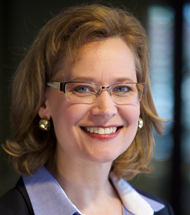"Universities and institutions that finance research are increasingly interested in interdisciplinary topics"
Amy Jo Coffey, a visiting researcher at the Center for Internet Studies and Digital Life, visited the Institute for Culture and Society, where she argued that, "interdisciplinary research is essential for solving the world's complex problems"

FOTO: Cedida
"Universities and institutions that finance research are increasingly interested in interdisciplinary topics,” or so Amy Jo Coffey, a professor at the University of Florida (USA), affirmed at the University of Navarra. The expert, who is on the Pamplona campus as a visiting researcher within the School of Communiation's Center for Internet Studies and Digital Life, gave a seminar at the Institute for Culture and Society.
Amy Jo Coffey pointed out that this way of working "is essential for solving the world's complex problems because most problems do not pertain to just one discipline" and that it is an increasingly valued trend. "Not only is it a way of the future; it is also a way of the present,"she emphasized.
She recognizes that this type of research takes more effort because "staying in our own corner is more comfortable," but she emphasizes that this attitude does not allow us "to solve new things." In addition, she admitted that it takes more time because each field has very different routines and methods, and even a different language. "Each discipline has its own words; it took me about four months to adapt to the words engineers use," she said.
As she explained, despite these difficulties, it is worth developing interdisciplinary research because it allows academics to address the same issue from different perspectives and knowledge.
Collaboration between different fields of knowledgeAs an example, she mentioned the lack of information in some countries about hand washing for improving public health. "Here, we must link medical data with effective communication so that people overcome mental or cultural obstacles," she said. To that end, she mentioned that experts from both areas, medicine and communication, are needed.
She also recalled collaboration between a team of doctors and computer engineers who disseminated information on how the flu would spread that year. "For this, they compared a variety of Internet searches on the illness’s symptoms," she added.
Along these lines, she alluded to a positive personal experience working in an interdisciplinary team with engineers. Her project consisted of designing a simulated country with virtual reality, including its culture, architecture, design, and character... This recreation prepared users for behavior differences and increased their intercultural sensitivity.
She pointed out that the program was aimed at military and government workers who, before traveling abroad, want to understand the culture and values of the inhabitants intheir destination. "This discovery shows that this is a very useful way to learn and teach," she said.
